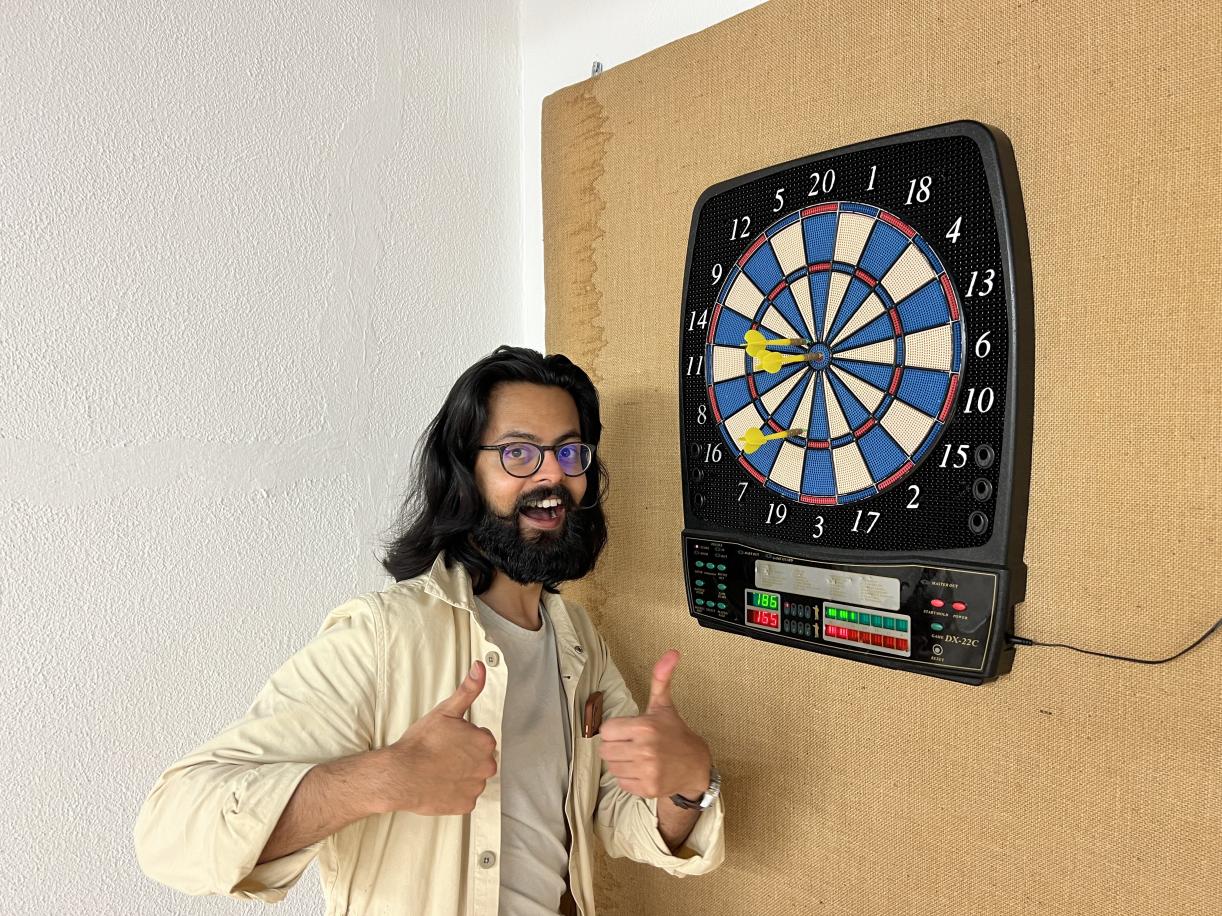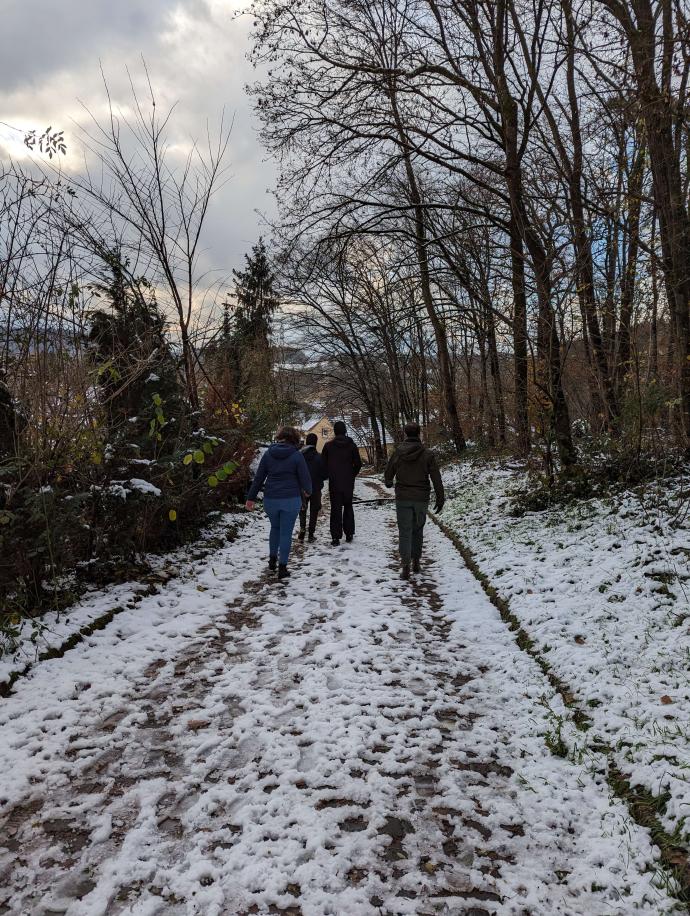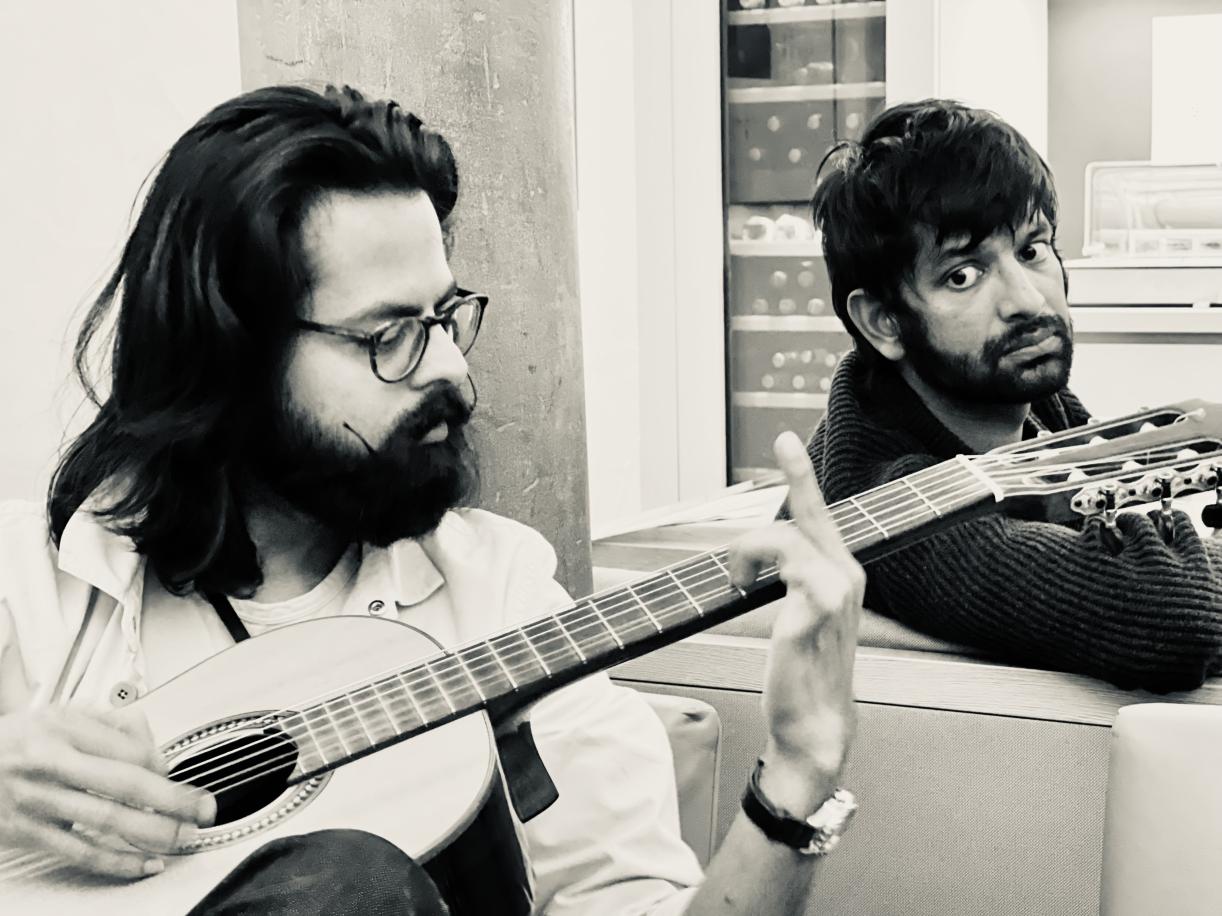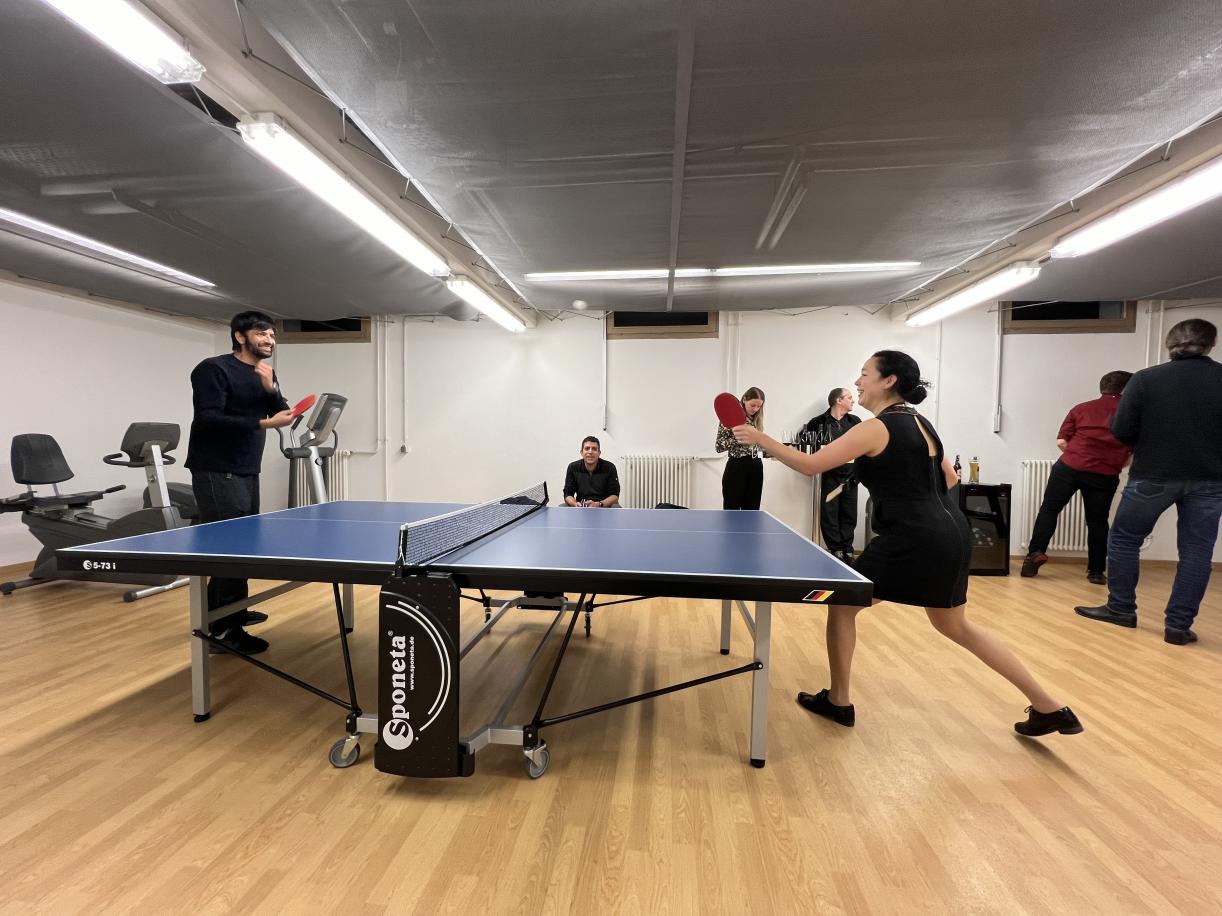Dagstuhl-Seminar 23482
Social XR: The Future of Communication and Collaboration
( 26. Nov – 01. Dec, 2023 )
Permalink
Organisatoren
- Mark Billinghurst (University of South Australia - Adelaide, AU)
- Pablo Cesar (CWI - Amsterdam, NL)
- Mar Gonzalez-Franco (Google - Seattle, US)
- Katherine Isbister (University of California at Santa Cruz, US)
- Julie Williamson (University of Glasgow, GB)
Kontakt
- Andreas Dolzmann (für wissenschaftliche Fragen)
- Jutka Gasiorowski (für administrative Fragen)
Programm
This Dagstuhl Seminar focused on Social XR and the future of communication and collaboration, with a particular interest on:
- Capturing and modelling of humans, ensuring realistic representation of the users and thus allowing for realistic and immersive experiences;
- Digital proxemics and social metrics, that help and enrich communication and collaboration between the participants;
- Instrumentation and evaluation, focusing on the possibility of evaluating and monitoring the experience of the users;
- Principles of Social XR, for making sure that the right values and principles are followed;
- Exploration of design approaches for Social XR, that support communication and connection by enabling and strategically heightening social signalling and dynamics.
To start the seminar, each participant presented relevant social XR research through rapid talks (see Section 2 and Figure 2 of the full report), which were then used to finalize the topics to discuss on the remaining days of the seminar. We settled on three topics that participants in small groups would focus on, led by members of the organizing committee with a provocation at the start of each day:
TUESDAY: Social XR Design Approaches, Ethics, and Values led by Katherine Isbister and Alexandra Kitson,
WEDNESDAY: Capturing and Modeling Social XR led by Mark Billinghurst and Mar Gonzalez-Franco,
THURSDAY: Proxemics, Metrics, Instrumentation, and Evaluation of Social XR led by Pablo Cesar and Julie Williamson,
THURSDAY: Grand Challenges of Social XR led by the organizers.
As a major result of the seminar, we identified the following grand challenges:
- Subjectivity of scientific evaluation of empathy
- Ethical concerns of sharing physiological data and social XR relationships
- Ethics of the growing digital divide
- Blending realities, beyond visual and audio
- Semantic understanding of the physical and social context
- Social stitching to create a cohesive scene or world
- Preserving privacy given the increasing fidelity of capture devices
- Tension between transparency and social superpowers
- Devising a shared platform that facilitates collaborative recording, replaying, and immersive experiences
- New metrics and questionnaires for social XR
In addition to the rapid talks and topic discussions, participants shared demos of their work on Tuesday:
- Alexandra Kitson - Embodied Telepresent Connection: An interactive art piece designed to support connection and pseudohaptics through visuals and audio http://ispace.iat.sfu.ca/project/etc/
- Alijosa Smolic - Volograms: record a video and turn it into an AR experience https://www.volograms.com/
- Anthony Steed - Ubiq: a free, open-source networking library for research, teaching and development https://ubiq.online/
- Zerrin Yumak - FaceXHuBERT: Text-less Speech-driven E(X)pressive 3D Facial Animation Synthesis using Self-Supervised Speech Representation Learning https://github.com/galib360/FaceXHuBERT
Social activities in the music room, cellar, games room, and sauna led to some discussions around capturing and modelling leading into Wednesday's session (see this social media post for some examples) as well as an impromptu research study on cross-reality asymmetrical co-located social games by playing two games: DAVIGO and Acron.




In terms of outputs and future collaborations, we plan to share our findings in an opinion article or forum. We have analyzed, written, and submitted the results of the impromptu research study in the cellar and games room to a top-tier conference in our field. Additionally, we have discussed a potential book on social XR with the seminar participants based on the topics of this seminar. We plan to hold follow-up events and workshops at relevant conferences to further explore the grand challenges that we identified through this seminar.
 Mark Billinghurst, Pablo Cesar, Mar Gonzalez-Franco, Katherine Isbister, and Julie Williamson
Mark Billinghurst, Pablo Cesar, Mar Gonzalez-Franco, Katherine Isbister, and Julie Williamson
We are rapidly moving towards a hybrid world where communication and collaboration occur in reality, virtuality, and everywhere in-between. But, are current technologies ready for such a shift? Available solutions for telepresence create exhaustion and fatigue because we lose key social signals when interacting remotely, for example there is a loss of mobility, limited capability for gesture, and inability to establish eye contact. This Dagstuhl Seminar aims to lay the foundations for a new paradigm for immersive communication and collaboration. Social Extended Reality (XR) systems promise to overcome the limitations of current real-time teleconferencing systems, enabling a better sense of immersion, enhancing the sense of presence, and fostering more successful interpersonal interactions. The possibility for familiar, meaningful, and strategically heightened social interaction in XR has positioned immersive technology as the future of real-time communication and collaboration.
XR is currently at a critical moment, with major corporations putting stakes in the ground for what our shared workplace future will be, and young people increasingly exploring creative new forms of casual interaction in rapidly growing XR platforms such as VR Chat, Ready Player Me, Spatial, and others, and also with technologies traditionally not thought of as XR, such as the Avatars already available to millions of users in tools like Microsoft Teams. It is timely to bring together participants with both industry and academic expertise to discuss the future of communication and collaboration at this inflection point.
The goal of this Dagstuhl Seminar is to explore social XR as the future of communication and collaboration. We aim to gather academics and practitioners from different disciplines in order to adequately address the open challenges of immersive interaction, including the ethical, legal, and societal aspects of this possible future. This seminar focuses on Social XR and the future of communication and collaboration, with a particular interest on:
- Capturing and modelling of humans, ensuring realistic representation of the users and thus allowing for realistic and immersive experiences;
- Digital proxemics and social metrics, that help and enrich communication and collaboration between the participants;
- Instrumentation and evaluation, focusing on the possibility of evaluating and monitoring the experience of the users;
- Principles of Social XR, for making sure that the right values and principles are followed;
- Exploration of design approaches for Social XR that support communication and connection by enabling and strategically heightening social signalling and dynamics.
 Mark Billinghurst, Pablo Cesar, Mar Gonzalez-Franco, Katherine Isbister, and Julie Williamson
Mark Billinghurst, Pablo Cesar, Mar Gonzalez-Franco, Katherine Isbister, and Julie Williamson
- Sun Joo Ahn (University of Georgia - Athens, US) [dblp]
- Mark Billinghurst (University of South Australia - Adelaide, AU) [dblp]
- Pablo Cesar (CWI - Amsterdam, NL) [dblp]
- Mustafa Doga Dogan (MIT - Cambridge, US) [dblp]
- Eric J Gonzalez (Google - Seattle, US) [dblp]
- Mar Gonzalez-Franco (Google - Seattle, US) [dblp]
- Josh Greenberg (Alfred P. Sloan Foundation - New York, US) [dblp]
- Jan Gugenheimer (TU Darmstadt, DE) [dblp]
- Linda Hirsch (LMU München, DE) [dblp]
- Katherine Isbister (University of California at Santa Cruz, US) [dblp]
- Alexandra Kitson (Simon Fraser University - Surrey, CA) [dblp]
- Kai Kunze (Keio University - Yokohama, JP) [dblp]
- Jie Li (EPAM - Hoofddorp, NL) [dblp]
- Neil McDonnell (University of Glasgow, GB) [dblp]
- Yun Suen Pai (Keio University - Yokohama, JP) [dblp]
- Sylvia Xueni Pan (University of London, GB) [dblp]
- Payod Panda (Microsoft Research - Cambridge, GB) [dblp]
- Alexander Raake (TU Ilmenau, DE) [dblp]
- David Ayman Shamma (Toyota Research Institute - Los Altos, US) [dblp]
- Aljosa Smolic (Hochschule Luzern - Rotkreuz, CH) [dblp]
- Anthony Steed (University College London, GB) [dblp]
- Kashyap Todi (Meta Reality Labs - Redmond, US) [dblp]
- Irene Viola (CWI - Amsterdam, NL) [dblp]
- Nadine Wagener (Universität Bremen, DE) [dblp]
- Julie Williamson (University of Glasgow, GB) [dblp]
- Zerrin Yumak (Utrecht University, NL) [dblp]
Klassifikation
- Human-Computer Interaction
Schlagworte
- Immersive Technology
- Social Extended Reality
- 3D Capture and Modelling
- Multisensory Experiences
- Digital Proxemics





 Creative Commons BY 4.0
Creative Commons BY 4.0
